Manjimup, Western Australia
Manjimup is a town in Western Australia, 307 kilometres (191 mi) south of the state capital, Perth. The town of Manjimup is a regional centre for the largest shire in the South West region of Western Australia. At the 2016 census, Manjimup had a population of 4,349.[1]
| Manjimup Western Australia | |||||||||
|---|---|---|---|---|---|---|---|---|---|
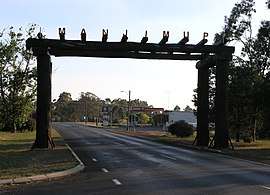 Entrance to Manjimup, late afternoon | |||||||||
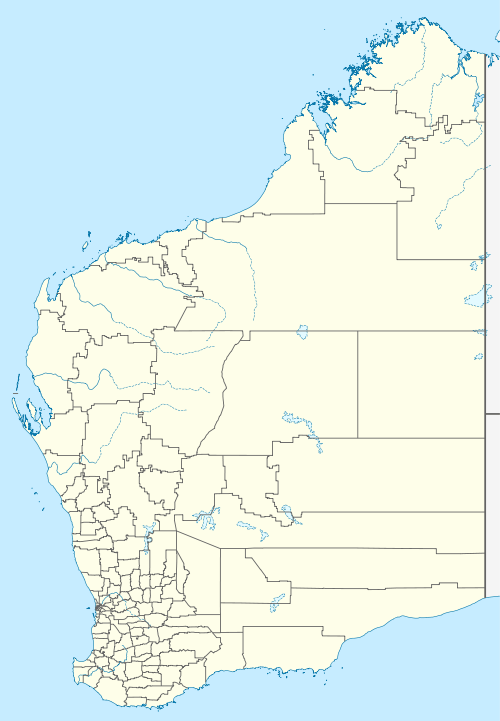 Manjimup | |||||||||
| Coordinates | 34°14′28″S 116°8′47″E | ||||||||
| Population | 4,349 (2016 census)[1] | ||||||||
| Established | 1856 | ||||||||
| Postcode(s) | 6258 | ||||||||
| Elevation | 287 m (942 ft)[2] | ||||||||
| Location |
| ||||||||
| LGA(s) | Shire of Manjimup | ||||||||
| State electorate(s) | Warren-Blackwood | ||||||||
| Federal Division(s) | O'Connor | ||||||||
| |||||||||
History
Manjimup was named after the Noongar words "Manjin" (a broad-leafed edible reed) and "up" (meeting place, or place of).[3] Manjimup was first settled by timber cutter Thomas Muir, who took up land near the present town site in 1856. It was declared a town in 1910, and a railway from Perth was completed in 1911.[4]
The population expanded when Manjimup became part of the post-World War I Group Settlement Scheme. The Group Settlement Scheme was largely unsuccessful because the land was difficult to clear and many of the new settlers were not experienced farmers. The settlers who stayed became dairy farmers, which ended during the 1930s Great Depression when the price of butterfat collapsed.[4]
Economy
Industry
Timber is the town's major industry, but it has been joined by fruit and vegetable farms, dairy farms, wool, grain and vineyards.[4] The Cripps Pink, better known as the Pink Lady apple, was created in Manjimup in 1973 by John Cripps of the Western Australian Department of Agriculture,[5] and the trademark is now used on products across four continents.[6] Manjimup used to produce frozen French fries,[7] and had a lucrative tobacco industry that ended in the 1960s.[8] Manjimup exports include marri flooring;[9] apples, primarily to India;[10] and spring water to Saudi Arabia, Singapore and India.[11]
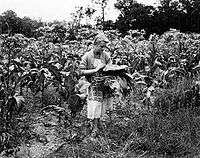
Manjimup is the leading Australian-mainland producer of black truffles,[12] and research on truffle-growing is conducted in collaboration with WA universities, with an annual government grant of $250,000 for three years.[13] Manjimup's climate is similar to that of Périgord and other truffle-growing areas of France.[13] Manjimup truffles are supplied to restaurants in Perth, Sydney and Melbourne, and requests for samples have been received from restaurants in France and Germany.[14]
Research is also being conducted on green tea production by the Department of Agriculture and Food and the Manjimup Horticultural Research Institute.[15] Japanese experts identified Manjimup as a suitable area for growing green tea based on "its climate, 'clean green' image, fertile soils and good rainfall".[15] The Manjimup/Pemberton area is at a similar latitude to the prime tea-growing area Shizuoka in Japan, and shares similar acidic soils and average annual temperature.[16] Trials of ten varieties of green tea will determine which will be the most successful.[15]
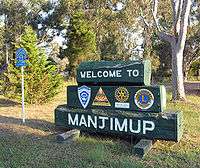
Tourism
Manjimup's tourist attractions include the Diamond Tree fire lookout; the Four Aces, which are four 75 metre-tall karri trees over 400 years old; One Tree Bridge, a bridge made of a single karri tree; Fonty's Pool; a timber museum called Manjimup Timber Park; and timber sawmills including Deanmill. During wildflower season from October to December, the King Jarrah Heritage Trail is home to various native flowers.[4]
Since 2001, an annual cherry festival has been held in December. The three-day festival features the crowning of the cherry king and queen and a cherry pit spitting competition, and is attended by some 5,000 visitors.[17][18] In 1980, Manjimup held its first motocross event, named the Manjimup 15000 International Motocross in honour of the $15,000 prize for first place.[19] The event was held annually in June until it was cancelled in 2006 due to public liability insurance issues and a lack of volunteers.[20] In 2005, the event drew 6,000 spectators and 340 competitors from Australia, New Zealand and the United States.[21] The event began running again in 2009.
Education
Two public primary schools and one public high school are located in Manjimup along with a Catholic K-12 school, Kearnan College. Manjimup Primary School opened in 1911, and moved to a new location in 2005.[22] Manjimup Primary School had 431 students in semester 2, 2007, with 40 of those students in part-time kindergarten.[22] The student attendance rate is 94%, compared with 93.1% statewide.[22] The school's students tend to remain in Manjimup for their secondary education.[23]
East Manjimup Primary School opened in 1971.[22] Seventy-five percent of students live in the town east of the railway line, with the remaining students from farms or smaller communities out of town or outside the school's catchment area.[22] The school had 331 students in semester 2, 2007, with 36 in part-time kindergarten.[22] Its student attendance rate is 93.2%.[22]
Kearnan College was founded by the Sisters of St Joseph of the Sacred Heart in 1925 and was originally called St Joseph's. The school had 461 students from kindergarten to year 12, as of September 2016.[24][25] It was only a primary school in its early years; the high school was added under parish priest Father Stephen Kelly in 1970. With this addition, Kearnan College became the first coeducational catholic school in Western Australia.[26]
The town's high school, Manjimup Senior High School, was established in 1957.[22] School facilities were upgraded in 1997 and 1999, with the addition of a Technology and Enterprise Centre and refurbishment of several areas.[22] Over half of its students travel to school on the school's buses, with the most distant students travelling more than 80 km, each way, per day.[22] The school catchment area includes Manjimup, Bridgetown, Northcliffe, Pemberton and Boyup Brook.[22] Manjimup Senior High School had 668 students in semester 2, 2007.[22] Selected school programmes are delivered in partnership with South West College of TAFE, Challenger TAFE, and Edith Cowan University.[22] The school consistently performs well in Tertiary Entrance Exam results.[27] In 2007, Manjimup Senior High School was the best performing state school in WA, placed at number 8 in the list of top-performing schools.[28]
Transportation
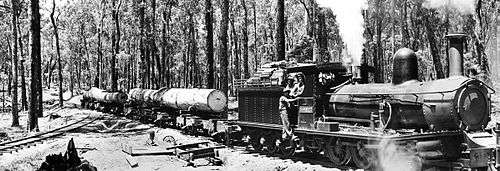
The railway from Bridgetown was extended to Wilgarup in 1909, and the railway line opened in 1911.[29] As the line's terminus was near the Manjimup homestead, the station was named Manjimup.[29] Aside from passengers, trains were used to transport timber to and from the sawmills in the area. The rail yards closed in 1997 and were redeveloped into Manji Park tourism precinct in 2003.[30]
Cars are the primary method of transport in Manjimup - according to the Australian Bureau of Statistics' 2006 census, 91% of people commuting to work were drivers or passengers in cars.[31] The next most popular method of transport was walking, at 4.5%.[31] The Manjimup Volunteer and Resource Centre runs a community bus service, primarily for youth, seniors, and people with disabilities[32] and the Public Transport Authority contracts school bus services to Warren Bus Service.[33]
Public transport between Perth and Manjimup consists of Transwa bus services 315 (Sunday) and 321 (Monday and Wednesday) from Perth to Pemberton via Bunbury, and 322 (Monday, Tuesday, Thursday) from Pemberton to Perth, also via Bunbury.[34] Travellers can also take the daily Australind train for the Perth to Bunbury portion of the journey.[35] South West Coach Lines travels between Perth and Manjimup on weekdays.[36]
Politics
Manjimup is located in the Western Australian electoral district of Blackwood-Stirling and Federal Division of O'Connor. The statistics below combine votes from the Manjimup and East Manjimup polling places.
|
|
| ||||||||||||||||||||||||||||||||||||||||||||||||||||||
|
|
| ||||||||||||||||||||||||||||||||||||||||||||||||||||||
Forestry issues
The Manjimup region has been the focus of forest issues for over 80 years - initially the development of the Group Settlement Scheme saw forests cleared for settlements, then in the 1970s the Manjimup woodchipping scheme attracted widespread interest in the concern for the karri forests of the region. Two conservation groups prominently involved were Campaign to Save Native Forests and South West Forests Defence Foundation. Subsequent to the woodchipping controversies, the issue of old growth forests saw considerable interaction between conservationists and local forestry organisations. The resultant conflicts were in part resolved by government intervention, reducing clearfell quotas and providing schemes to re-deploy forestry workers made redundant by the reduction in the industry.
Climate
Manjimup has a mild Mediterranean climate, with cool wet winters and warm dry summers.[37] Manjimup's longest consecutive run of cold days was 20 days between 13 July and 1 August 1958, and its longest consecutive wet spell was 44 days between 1 July to 13 August 1946.[38] During this period, 374 mm of rain fell.[38]
| Climate data for Manjimup, Western Australia (inland) | |||||||||||||
|---|---|---|---|---|---|---|---|---|---|---|---|---|---|
| Month | Jan | Feb | Mar | Apr | May | Jun | Jul | Aug | Sep | Oct | Nov | Dec | Year |
| Record high °C (°F) | 42.7 (108.9) |
41.6 (106.9) |
41.2 (106.2) |
34.4 (93.9) |
29.2 (84.6) |
22.9 (73.2) |
21.6 (70.9) |
24.6 (76.3) |
30.4 (86.7) |
33.3 (91.9) |
38.7 (101.7) |
41.1 (106.0) |
42.7 (108.9) |
| Average high °C (°F) | 27.2 (81.0) |
27.1 (80.8) |
24.2 (75.6) |
21.1 (70.0) |
17.7 (63.9) |
15.4 (59.7) |
14.4 (57.9) |
15.1 (59.2) |
16.5 (61.7) |
18.9 (66.0) |
22.0 (71.6) |
24.9 (76.8) |
20.4 (68.7) |
| Average low °C (°F) | 13.1 (55.6) |
13.4 (56.1) |
12.5 (54.5) |
10.8 (51.4) |
8.9 (48.0) |
7.5 (45.5) |
6.4 (43.5) |
6.5 (43.7) |
7.2 (45.0) |
8.3 (46.9) |
10.1 (50.2) |
11.7 (53.1) |
9.7 (49.5) |
| Record low °C (°F) | 6.0 (42.8) |
5.6 (42.1) |
3.3 (37.9) |
1.6 (34.9) |
−0.6 (30.9) |
0.2 (32.4) |
−0.6 (30.9) |
0.0 (32.0) |
0.6 (33.1) |
0.1 (32.2) |
2.3 (36.1) |
4.4 (39.9) |
−0.6 (30.9) |
| Average precipitation mm (inches) | 20.0 (0.79) |
18.6 (0.73) |
29.9 (1.18) |
59.5 (2.34) |
129.2 (5.09) |
161.6 (6.36) |
174.1 (6.85) |
145.0 (5.71) |
108.9 (4.29) |
75.1 (2.96) |
46.1 (1.81) |
25.3 (1.00) |
994.2 (39.14) |
| Average precipitation days | 5.9 | 5.9 | 7.6 | 11.6 | 17.6 | 20.1 | 22.3 | 21.0 | 17.7 | 15.1 | 10.5 | 7.3 | 162.6 |
| Average afternoon relative humidity (%) (at 1500) | 43 | 44 | 48 | 58 | 65 | 71 | 71 | 68 | 64 | 57 | 51 | 47 | 57 |
| Source: [39] | |||||||||||||
Notable people
- Piero Balbo (1916–2003), lawyer, commander of Italian partisan groups 1943–1945, was born in Manjimup[40]
- John Chester, eco-terrorist with criminal convictions for armed bank robbery, car theft, assault and confinement, theft of explosives and destruction of property. He carried out the 1976 Bunbury woodchip bombing in an attack on the port's woodchip exporting infrastructure.[41][42]
- Walter Handmer AM (1927–2007), Australian diplomat, lived in Manjimup from the early 1930s until 1944
- Shelly Liddelow (born 1984), Olympic field hockey player, born in Manjimup
- Marlion Pickett (born 1992), Australian rules footballer who plays for Richmond Football Club in the Australian Football League (AFL), born in Manjimup
- Matt Priddis (born 1985), former Australian rules footballer and Brownlow Medal winner who played for the West Coast Eagles in the Australian Football League (AFL), born in Manjimup.
- Sam Kekovich (born 1950), former Australian rules footballer who played for North Melbourne and Collingwood in the Victorian Football League (now Australian Football League), and Australian Lamb Meat Ambassador, born in Manjimup.[43]
References
- Australian Bureau of Statistics (27 June 2017). "Manjimup (State Suburbs)". 2016 Census QuickStats. Retrieved 23 May 2018.

- "Monthly climate statistics - Manjimup". Bureau of Meteorology. Retrieved 8 May 2008.
- "Shire of Manjimup: A Brief History". Archived from the original on 12 December 2007. Retrieved 10 January 2008.
- "Travel: Manjimup". The Sydney Morning Herald. 8 February 2004. Retrieved 10 January 2008.
- Bateman, Michael (20 May 2001). "Food: Pretty in pink". The Independent (London). Retrieved 10 January 2008.
- "Aussie IP: Pink Lady Apples". Archived from the original on 10 June 2011. Retrieved 10 January 2008.
- "Department of Agriculture and Food: Manjimup Office". Archived from the original on 17 February 2001. Retrieved 10 January 2008.
- "South West Life: Manjimup". Archived from the original on 29 August 2007. Retrieved 10 January 2008.
- "Manjimup property to make export flooring". ABC News. 2 September 2004. Retrieved 29 January 2008.
- "India taken with Manjimup apples". ABC News. 21 June 2004. Retrieved 29 January 2008.
- "Manjimup farmer set to export water". ABC News. 4 October 2007. Retrieved 29 January 2008.
- "Getaway fact sheets: Manjimup truffles". Archived from the original on 19 May 2006. Retrieved 22 January 2008.
- Elen, Judith (14 July 2007). "WA truffles in black gold rush". The Australian. Retrieved 22 January 2008.
- Hartnet, Michelle. "Australian ingenuity spawns new industry". Archived from the original on 25 August 2006. Retrieved 22 January 2008.
- "Green tea served up in Manjimup". 20 November 2006. Archived from the original on 16 July 2011. Retrieved 29 January 2008.
- "Growing green tea in Western Australia : development of a green tea industry in the Manjimup/Pemberton area". June 2001. Archived from the original on 3 September 2008. Retrieved 29 January 2008.
- "Cherry festival fever picks up". Manjimup-Bridgetown Times. 12 November 2006. Archived from the original on 21 January 2008. Retrieved 10 January 2008.
- "Manjimup celebrates cherry festival". ABC News. 15 December 2006. Retrieved 16 April 2008.
- Olsen, Graeme (May 2005). "South West Life: Manjimup 15000". Archived from the original on 30 October 2007. Retrieved 10 January 2008.
- "Shire laments motocross race cancellation". ABC Sport Online. 30 March 2006. Archived from the original on 8 August 2007. Retrieved 10 January 2008.
- "Thousands flock to see motocross stars shine in Manjimup". ABC News Online. 7 June 2005. Retrieved 10 January 2008.
- "Department of Education and Training - Schools Online". Archived from the original on 28 October 2007. Retrieved 2 February 2008.
- "Manjimup Primary School Annual School Report for 2006". Archived from the original (PDF) on 25 October 2009. Retrieved 2 February 2008.
- "Alphabetical List of Western Australian Schools" (pdf). Department of Education. Perth, WA: Government of Western Australia. 8 September 2016. p. 18. Retrieved 8 September 2016.
- http://www.kearnan.wa.edu.au
- http://inherit.stateheritage.wa.gov.au/Public/Inventory/Details/9576168d-a0df-49dc-92e7-475e2c881b29
- Varischetti, Belinda (1 November 2007). "Manjimup Senior High School one of WA's top performers". ABC Rural Bush Telegraph. Retrieved 2 February 2008.
- "Private schools outperform public schools in TEE". ABC News. 8 January 2008. Retrieved 2 February 2008.
- Western Australian Land Information Authority. "History of country town names – M". Retrieved 2 March 2008.
- "Rail yards transformed into tourism site". ABC News. 15 December 2003. Retrieved 2 March 2008.
- Australian Bureau of Statistics (31 October 2012). "2011 Community Profiles: Manjimup (L) (Urban Centre/Locality)". 2011 Census of Population and Housing. Retrieved 28 October 2013.

- "Shire of Manjimup & Manjimup Volunteer & Resource Centre: Community bus". Archived from the original on 23 July 2008. Retrieved 10 October 2008.
- "Regional town bus services". Public Transport Authority. 26 July 2007. Archived from the original on 19 July 2008. Retrieved 2 March 2008.
- "SW2 Perth to Pemberton via Bunbury timetable" (PDF). Transwa. 26 November 2017. Retrieved 14 June 2018.
- "Australind timetable" (PDF). Transwa. 29 August 2016. Archived from the original (PDF) on 15 June 2017. Retrieved 14 June 2018.
- "Manjimup" (PDF). South West Coach Lines. Retrieved 14 June 2018.
- "Australia's South West: Climate". Retrieved 2 March 2008.
- "Fascinating weather facts for the South West 18th June". ABC South West WA. 24 June 2004. Archived from the original on 14 December 2004. Retrieved 2 March 2008.
- "Climate Statistics for Australian Locations". Bureau of Meteorology. Australian Government. 2017. Retrieved 4 September 2017.
- "Piero Balbo". Donne e uomini della Resistenza. Associazione Nazionale Partigiani d'Italia. Retrieved 7 May 2016.
- "Chester, Mr John - Sentence. High Court and Supreme Court Decisions - Report" (pdf). Hansard. Perth, WA: Legislative Assembly. 4 April 1989. p. 203. Retrieved 24 May 2018.
- Chapman, Ron (2008). "Fighting for the Forests: A History of The Western Australian Forest Protest Movement 1895-2001" (PDF). Murdoch University (Thesis). Perth, WA. pp. 121–126. Retrieved 25 May 2018.
- "Sam Kekovich". Collingwood. Retrieved 22 January 2019.
External links
- Shire of Manjimup
- Manjimup Visitor Centre
- Manjimup Cemetery and Historical Records
- Manjimup Volunteer & Resource Centre